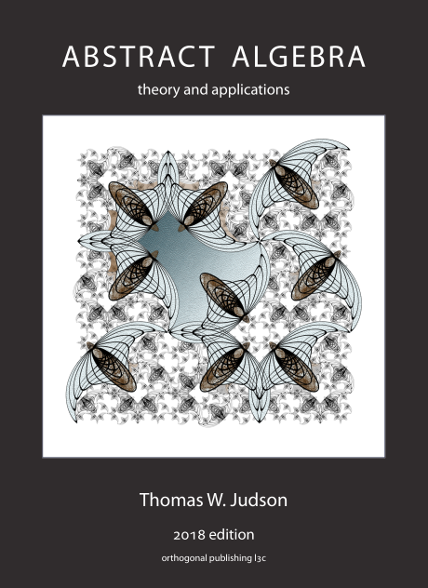By Lemma
5.15, we can assume that
\begin{align*}
\alpha(x) & = \frac{c_1}{d_1} (a_0 + a_1 x + \cdots + a_m x^m ) = \frac{c_1}{d_1} \alpha_1(x)\\
\beta(x) & = \frac{c_2}{d_2} (b_0 + b_1 x + \cdots + b_n x^n) = \frac{c_2}{d_2} \beta_1(x),
\end{align*}
where the \(a_i\)’s are relatively prime and the \(b_i\)’s are relatively prime. Consequently,
\begin{equation*}
p(x) = \alpha(x) \beta(x) = \frac{c_1 c_2}{d_1 d_2} \alpha_1(x) \beta_1(x) = \frac{c}{d} \alpha_1(x) \beta_1(x),
\end{equation*}
where \(c/d\) is the product of \(c_1/d_1\) and \(c_2/d_2\) expressed in lowest terms. Hence, \(d p(x) = c \alpha_1(x) \beta_1(x)\text{.}\)
If \(d = 1\text{,}\) then \(c a_m b_n = 1\) since \(p(x)\) is a monic polynomial. Hence, either \(c=1\) or \(c = -1\text{.}\) If \(c = 1\text{,}\) then either \(a_m = b_n = 1\) or \(a_m = b_n = -1\text{.}\) In the first case \(p(x) = \alpha_1(x) \beta_1(x)\text{,}\) where \(\alpha_1(x)\) and \(\beta_1(x)\) are monic polynomials with \(\deg \alpha(x) = \deg \alpha_1(x)\) and \(\deg \beta(x) = \deg \beta_1(x)\text{.}\) In the second case \(a(x) = -\alpha_1(x)\) and \(b(x) = -\beta_1(x)\) are the correct monic polynomials since \(p(x) = (-\alpha_1(x))(- \beta_1(x)) = a(x) b(x)\text{.}\) The case in which \(c = -1\) can be handled similarly.
Now suppose that \(d \neq 1\text{.}\) Since \(\gcd(c, d) = 1\text{,}\) there exists a prime \(p\) such that \(p \mid d\) and \(p \notdivide c\text{.}\) Also, since the coefficients of \(\alpha_1(x)\) are relatively prime, there exists a coefficient \(a_i\) such that \(p \notdivide a_i\text{.}\) Similarly, there exists a coefficient \(b_j\) of \(\beta_1(x)\) such that \(p \notdivide b_j\text{.}\) Let \(\alpha_1'(x)\) and \(\beta_1'(x)\) be the polynomials in \({\mathbb Z}_p[x]\) obtained by reducing the coefficients of \(\alpha_1(x)\) and \(\beta_1(x)\) modulo \(p\text{.}\) Since \(p \mid d\text{,}\) \(\alpha_1'(x) \beta_1'(x) = 0\) in \({\mathbb Z}_p[x]\text{.}\) However, this is impossible since neither \(\alpha_1'(x)\) nor \(\beta_1'(x)\) is the zero polynomial and \({\mathbb Z}_p[x]\) is an integral domain. Therefore, \(d=1\) and the theorem is proven.

